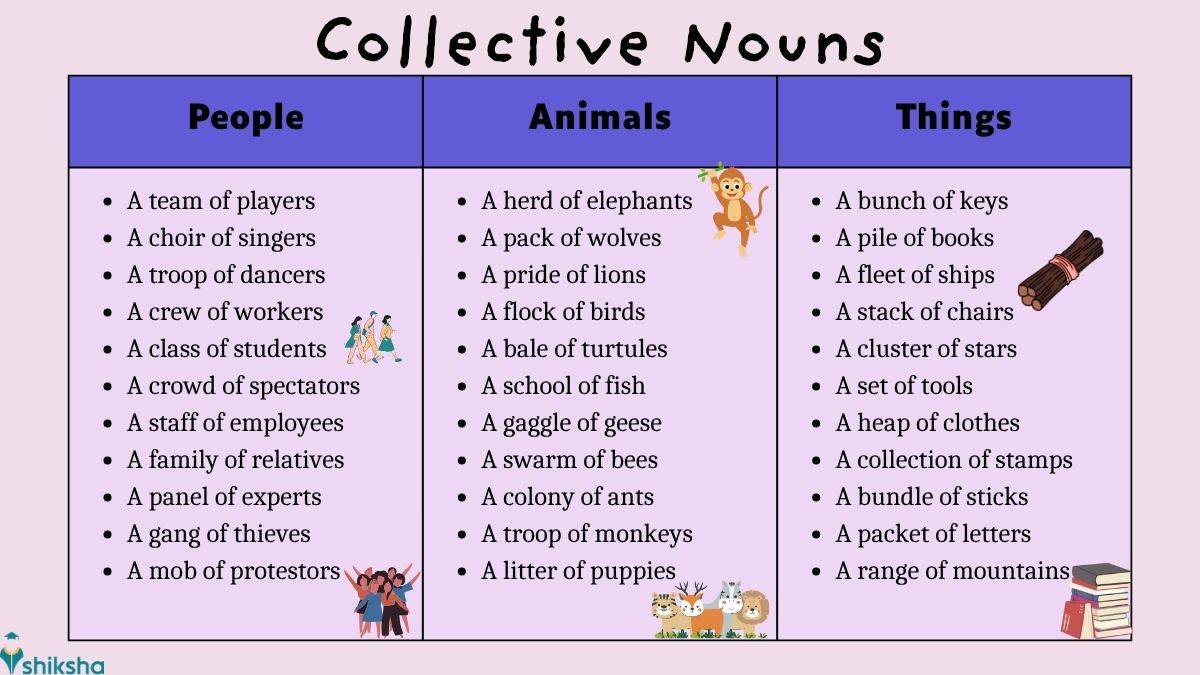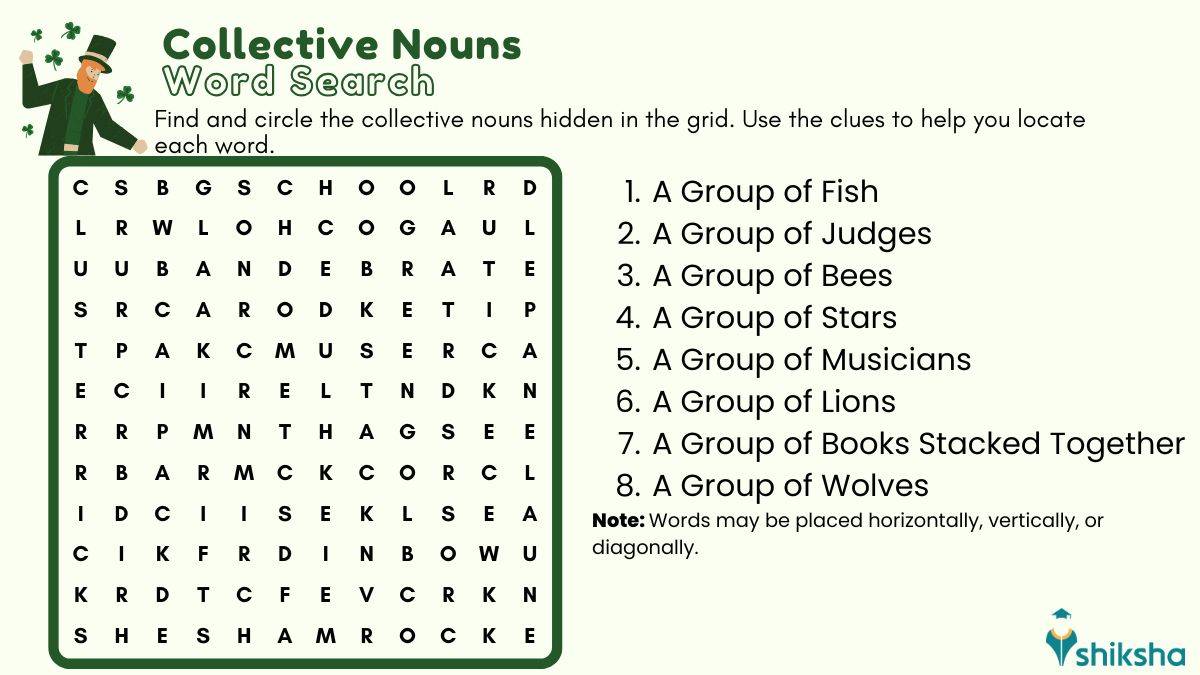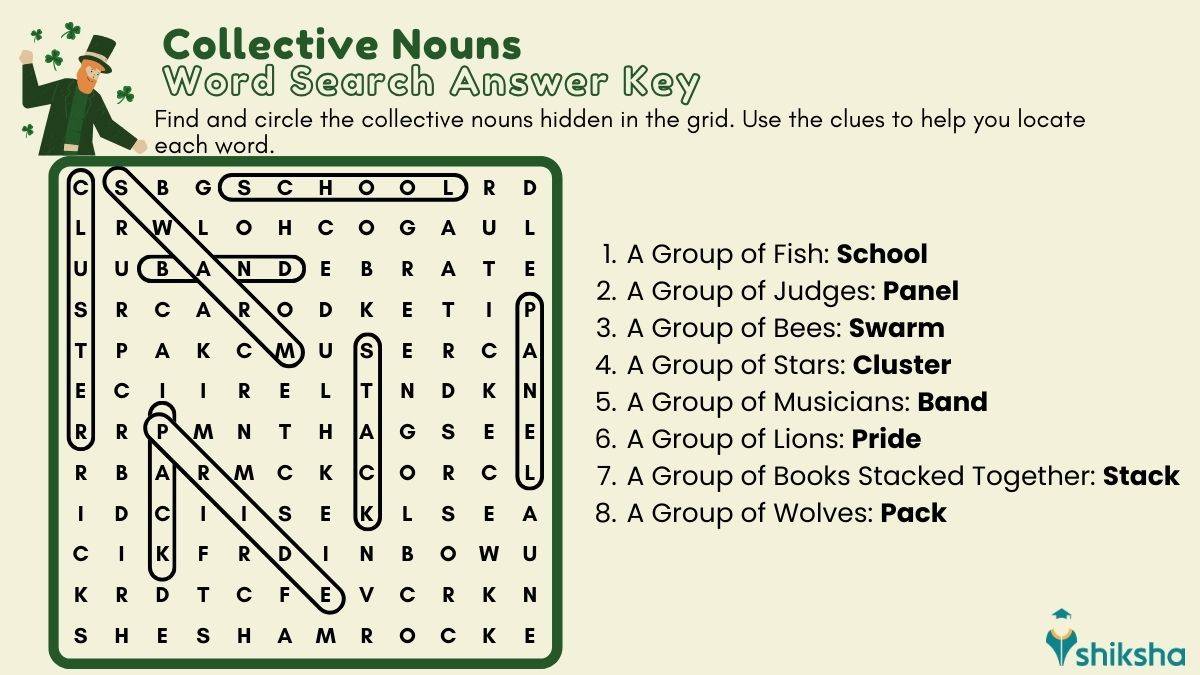
Have you ever thought why we call it a bunch of flowers, a swarm of bees, or a troupe of actors? The words bunch, swam, and troupe are special words (known as collective nouns) as they help describe a group as one single unit. Collective nouns in English are the nouns used to describe a collection or group of animals, people, or things as a whole.
In this article, we will help you understand what collective nouns are and how they are used in a sentence. Learn how to accurately use collective nouns with verbs with the help of some collective noun examples. Get a list of collective nouns to learn. Find practice exercises with answers to test your understanding of the topic.
Can a collective noun refer to people?
Yes, there are many collective nouns in English that are used for groups of people. For instance, in school we use class for students, and in music, we use choir for singers.
Collective Nouns for People
- A committee of members
- A crowd of spectators
- A herd of harlots
- A gang of prisoners
- A giggle of girls
- A pack of thieves
- A panel of experts
- A mob of rioters
Can collective nouns only be used for group of things?
No, collective nouns are not just restricted to objects. According to Oxford Dictionary collective noun is, “a singular noun, such as committee or team, that refers to a group of people, animals or things.
Here are some collective nouns examples for reference.
| Collective Nouns | ||
|---|---|---|
| People | Things | Animals |
|
|
|
- What is a Collective Noun?
- Collective Noun Definition
- List of Common Collective Nouns
- Collective Nouns and Abstract Nouns
- Use of Collective Nouns in a Sentence
- Collective Nouns and Verb Agreement in English Grammar
- Tips to Master English Collective Nouns
- English Grammar Books for Collective Nouns
- Examples of Collective Nouns
- Collective Noun Exercise with Answers
- Related English Grammar Topics for Preparation
- Frequently Asked Questions on Collective Nouns
What is a Collective Noun?
A collective noun is a word in English grammar that represents a group of animals, people, or objects/things as a single unit. To avoid naming each member of a group individually, collective nouns help refer to the group as a whole. Examples include herd, flock, fleet, gang, and choir.
Singular Form:
Collective Nouns typically take singular verbs, even though they refer to more than one individual, because they are considered as one unit. However, there are some cases in which the individuals in the group act separately. In those cases, the collective noun takes a plural verb.
Collective Noun Examples:
- A bunch of keys were lying on the floor.
- A troop of dancers is participating in India’s Got Talent.
- We saw a parliament of owls in the jungle.
Commonly asked questions
What are the collective nouns of animals?
Collective nouns for animals are the English words used to name a group of the same species. For instance, instead of saying 'many lions' we say 'a pride of lions'. Similarly, there are unique names for different groups of animals.
Collective Nouns of Animals Examples
- A murder of crows
- A gaggle of geese
- A school of fish
- A flock of birds
- a tower of giraffes
- A drove of horses
- A nest of mice
Is police a collective nouns?
Yes, 'police' is a collective noun. It represents a body of officers acting together. Additionally, unlike many other English collective nouns, 'police' is always used with a plural verb. Simply put, instead of saying 'police is', we say 'police are'.
For example:
- The police have arrested the thief.
- The police are patroling on the streets of New York.
Is United Nations a collective noun?
Yes, 'United Nations' can be considered as a collective noun. It represents a group of countries working together for global issues like human rights, health, peace, etc. The United Nations is made up of many members, but is treated as one organization, making it a collective noun.
Example:
- The United Nations has declared a new healthcare policy.
- The United Nations is working to stop climate change.
Collective Noun Definition
Definition of Collective Noun: Oxford Dictionary
According to Oxford Dictionary, “a singular noun, such as committee or team, that refers to a group of people, animals or things and, in British English, can be used with either a singular or a plural verb. In American English, it must be used with a singular verb.”
Example of Collective Nouns:
- A choir of singers performed at the church.
- She placed a bunch of flowers in the vase.
- A pack of dogs ran after a little girl.
Word Origin: The term “Collective” comes from the Latin word collectivus, meaning “gathered together”. Whereas the term “Noun” comes from the Latin word nomen, meaning “name”.
Pronunciation:
UK: /kəˌlek.tɪv ˈnaʊn/
US: /kəˌlek.tɪv ˈnaʊn/
Definition of Collective Noun: Cambridge Dictionary
According to the Cambridge Dictionary, “a noun that describes a group of things or people as a unit.”
List of Common Collective Nouns
Refer to the table below for a list of common collective nouns in English grammar, grouped in different categories.
Collective Nouns for People
Below is the list of collective nouns for people along with their groups.
| Collective Noun |
Group |
|---|---|
| Choir |
Singers |
| Gang |
Thieves, Criminals |
| Panel |
Judges, Experts |
| Team |
Players, Athletes, Workers |
| Crew |
Sailors, Flight Staff |
Collective Nouns for Animals
Check out list of collective nouns for animals and their groups.
| Collective Noun |
Group |
|---|---|
| Flock |
Birds, Sheep |
| Swarm |
Bees, Insects |
| Colony |
Ants, Penguins |
| Herd |
Cows, Deer, Elephants |
| Pack |
Wolves, Dogs |
Collective Nouns for Things
Below table consists of a list of collective nouns for things categorized in different groups.
| Collective Noun |
Group |
|---|---|
| Pile |
Clothes, Papers |
| Series |
Books, Programs |
| Cluster |
Stars, Flowers, Grapes |
| Bunch |
Grapes, Keys, Bananas |
| Set |
Tools, Dishes, Stamps |
Abstract Collective Nouns
Apart from people, animals, and things, there are other collective nouns for abstract concepts, events, actions, etc. The table below includes some of these collective nouns.
| Collective Noun |
Group |
|---|---|
| A murder |
Crows |
| A parliament |
Owls |
| A galaxy |
Stars |
| A troop |
Scouts, Dancers |
| A host |
Angels |
Also Read:
| List & Meaning of Idioms | List of Vocabulary Words | List of Commonly Used Synonyms |
Collective Nouns and Abstract Nouns
In English Grammar, collective nouns and abstract nouns are the two types of English nouns. Let’s understand the meaning of collective and abstract nouns with the help of some examples.
Collective Nouns in English
As learnt earlier, collective nouns are a group of people, animals, or things that are considered as a whole. It includes Team, Class, Bunch, Jury, Flock, etc.
Collective Nouns Examples:
- The jury has made its decision.
- This class is known for its mischiefs.
Abstract Nouns in English
On the other hand, abstract nouns describe the idea, feeling, state, or quality that cannot be seen or touched. Simply put, abstract nouns name things that exist as a concept or in the mind only. These include Freedom, Loyalty, Hate, Love, Anxiety, etc.
Abstract Nouns Examples:
- The children love their teachers.
- One must respect their elders.
Use of Collective Nouns in a Sentence
Learn how to use English collective nouns in a sentence.
1. Verbs in Collective Nouns
In general, collective nouns take singular verbs, as they are treated as a single unit. However, they can also take plural verbs, depending on the meaning.
If the group acts as one, a singular verb is used. On the other hand, if the group’s members act individually, a plural verb is used in the sentence.
Examples:
- The team won the match.
- The family are packing their own bags.
Note: American English usually treats collective nouns as singular, while British English also uses the plural form of the verb in case members of the group act independently.
Also Read: Different Forms of Verbs in English
2. As the Subject or Object of the Sentence
We can use collective nouns as the subject or object of a sentence. Also, note that its placement as a subject or object does not change the use of a plural or singular verb.
Example:
- The class is participating in the play. (Subject)
- We saw a pride of lions during the jungle safari. (Object)
3. Use with Articles or Quantifiers
We can also use collective nouns with articles or quantifiers. The English articles or quantifiers helps define or count the groups.
Example:
- A pack of cards is not enough for this game. (Singular) (Article ‘a’)
- Several groups of employees went for the field trip. (Plural) (Quantifier ‘Several’)
4. Be Consistent with Verbs and Pronouns
After deciding the singular or plural form of the verb, maintain consistency in the verbs and pronouns throughout the sentence or paragraph.
Example:
- The committee has reviewed all the applicants. They have decided to select only five candidates. (Incorrect)
(Here, ‘committee’ is singular, but ‘they’ is plural)
- The committee has reviewed all the applicants. It has decided to select only five candidates. (Correct)
Collective Nouns and Verb Agreement in English Grammar
As defined, collective nouns refer to a group of animals, people, or things and are considered a single unit, thus taking a singular verb. However, with subject-verb agreement, collective nouns can be tricky, as they may take singular or plural verbs. Whether a singular or plural verb is to be used depends on the meaning and context of the sentence.
Collective Nouns and Singular Verb
When the group is acting as a single unit, a singular verb is used in the sentence.
Example:
- The team is practicing for the next match.
- The audience is enjoying the performance.
Here, both the team and the audience are considered as one single group or entity.
Collective Nouns and Plural Verb
When the members of the group are acting individually, a plural verb is used in the sentence.
Example:
- The committee have different opinions on how to organize the event.
- The jury are delivering their verdict.
Here, the members of the committee and the jury are acting individually.
Tips to Master English Collective Nouns
Follow these tips to have a strong hold on Collective Nouns:
1. First of all, understand the basics of Collective Nouns. Learn the meaning of collective nouns and understand how to use them in a sentence.
2. Categorize collective nouns into three groups:
- Collective Nouns for People
- Collective Nouns for Animals
- Collective Nouns for Things
It will help you easily determine and learn collective nouns for different people, animals, and objects. Prepare a list of your own with three columns as people, animals, and objects, respectively, and daily fill in the columns with words you see every day in the appropriate column. Then every week search and learn what their group is called (collective noun).
3. Try to frame sentences of your own with the collective nouns. The best way to remember a collective noun for a group is by deliberately using it in a conversation.
4. Make flashcards to learn and revise collective nouns. Consistently revising them will help answer questions in exams.
5. Revise at least 10 collective nouns every 2-3 days.
6. Play online games and quizzes for a little fun and knowledge.
English Grammar Books for Collective Nouns
Examples of Collective Nouns
Collective Noun Exercise with Answers
Related English Grammar Topics for Preparation
Frequently Asked Questions on Collective Nouns
Commonly asked questions
What is collective noun in English Grammar?
A collective noun is a word given to group of people, things or animals. Example: herd, family, flock, government and so forth.
These nouns are usually treated as a singular noun even though it refers to a group of animal, thing or people.
What are 20 examples of collective nouns?
Below are 20 examples of collective nouns.
A flock of birds | A bouquet of flowers |
A swarm of bees | A crew of sailors |
A bunch of grapes | A library of books |
A school of fish | A fleet of ships |
A colony of ants | A pride of lions |
A jury of judges | A herd of cattle |
A gaggle of geese | A crowd of people |
A troop of scouts | A class of students |
A team of players | A band of musicians |
A staff of employees | A crew of sailors |
Are collective nouns singular or plural?
A collective noun can be singular or plural. It depends on how the group is acting in the sentence. To determine whether a singular or plural verb is to be used, one must check the context of the sentence.
Singular Verb: If the group is acting as one unit.
- Example: The team is winning the match.
Plural Verb: If the individuals of the group are acting separately.
- Example: The team are arguing among themselves.
Can collective nouns be used with both countable and uncountable nouns?
Collective nouns are usually used with countable nouns like people, animals, and things. There are rare cases when collective nouns are used with uncountable nouns.
Example:
- A herd of elephants. (Correct)
- A herd of sugar. (Incorrect)
Can collective nouns be proper nouns?
No, collective nouns cannot be proper nouns, as collective nouns refer to a group, while proper nouns refer to specific names. However, collective nouns are common nouns.
Collective Nouns: A series of books, A faculty of teachers
Proper Nouns: Amazon, Radhika, India
Can the same collective noun be used for different groups?
Yes, there are some collective nouns that are used to describe multiple types of groups.
Example:
- A Crew: Sailors, Airline Staff, Film Production Teams
- A Team: Office Colleagues, Project Groups, Sports Players
- A Band: Musicians, Robbers, Soldiers
- A Pack: Cards, Dogs, Wolves
- A Fleet: Cars, Ships, Planes
- A Set: Dishes, Tools, Rules
What are the types of Nouns?
There are nine types of nouns:
- Proper Nouns: A proper noun is a noun that refers to specific person, place, animar or thing.
- Common Nouns: A Common Noun is a name shared by every person or thing of the same class and kind.
- Concrete Nouns: It is a noun which describe physical sense of something. An object which can be touched, seen, heard, smelled or tasted as tagged as concrete nouns.
- Abstract Nouns: These nouns are used to tell about things which cannot be seen or sensed. These are ideas, emotions, or any intangible things.
- Collective Nouns: Collective nouns refers to naming word used for a group of animal, things or person.
- Countable Nouns: These nouns refer to nouns which can be measured or counted.
- Uncountable Nouns: Uncountable nouns refer to nouns which cannot be measures or counted
- Singular Nouns: Singular nouns are used to name a single person, place or thing.
- Plural Nouns: These are used to refer number of people, places or things. Plural nouns are formed by adding 's', 'es', 'ies' or 'ves'.
English Nouns Exam
Student Forum
Other Topics under this Chapter
Other Class 10th English Chapters
- English Past Tense
- English Idioms
- English Punctuation
- English Analogy
- English Interjections
- English Prefixes
- English Adjectives
- English Future Continuous Tense
- English Letter Writing
- English Suffix
- English Grammar
- English One Word Substitution
- English Mood
- English Direct and Indirect Speech
- English Figures of Speech
- English Composition
- English Para Jumbles
- English Reading Comprehension
- English Sentences
- English Auxiliary and Modal Verbs
- English Formation of Words
- English Precis Writing
- English Nouns
- English Adverbs
- Conjunctions
- English Prepositions
- English Verbs
- English Paraphrasing
- English Articles
- English Subject and Predicate
- English Pronouns
- English Tenses
- English Active and Passive Voice
- English Vocabulary
- English Subject Verb Agreement
- English Phrases
- English Synonyms
- English Etymology and Roots
- English Spelling Rules
- English Parts of Speech
- English Gerunds



